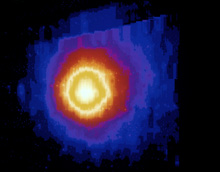http://www.nasa.gov/mission_pages/kepler/main/index.html
*Kepler Set to Launch Tonight*
The Kepler spacecraft and its Delta II rocket are "go" for a launch tonight that is expected to light up the sky along Florida's Space Coast at *10:49 p.m. EST* as the rocket lifts off from Launch Complex 17-B at Cape Canaveral Air Force Station. Weather predictions remain good, with a 95 percent chance of favorable conditions at launch time and a temperature of 64 degrees.
-----------------------------------------
Thanks for looking up with me.
Larry Kellogg
Web Site: http://lkellogg.vttoth.com/LarryRussellKellogg/
BlogSpot: http://kelloggserialreports.blogspot.com/
RSS link: http://kelloggserialreports.blogspot.com/atom.xml
Newsletter: https://news.altair.com/mailman/listinfo/lunar-update
==============================================================
http://www.nasa.gov/multimedia/nasatv/index.html
NASA TV of launch
snip
==============================================================
http://www.redorbit.com/news/space/1646290/kepler_to_launch_march_6_aboard_delta_ii_rocket/index.html
Download full size image
Kepler To Launch March 6 Aboard Delta II Rocket
Posted on: Friday, 27 February 2009, 07:50 CST
Launch of NASA's Kepler telescope is targeted for no earlier than Friday, March 6, from Pad 17-B at Cape Canaveral Air Force Station in Florida. There are two launch windows, from 10:49 - 10:52 p.m. and 11:13 - 11:16 p.m. EST.
Kepler is a spaceborne telescope designed to search the nearby region of our galaxy for Earth-size planets orbiting in the habitable zone of stars like our sun. The habitable zone is the region around a star where temperatures permit water to be liquid on a planet's surface.
Liquid water is considered essential for the existence of life as we know it. The vast majority of the approximately 300 planets known to orbit other stars are much larger than Earth, and none is believed to be habitable. The challenge for Kepler is to look at a large number of stars in order to statistically estimate the total number of Earth-size planets orbiting sun-like stars in the habitable zone. Kepler will survey more than 100,000 stars in our galaxy.
Engineers are reviewing all common hardware between the Delta II rocket carrying the Kepler telescope and the Taurus XL launch vehicle. On Tuesday, a Taurus carrying NASA's Orbiting Carbon Observatory failed to reach orbit. Managers want to confirm there will not be similar issues with Kepler's Delta II.
snip
==============================================================
WHAT THE MIND CAN CONCEIVE, AND BELIEVE, IT WILL ACHIEVE - LRK
==============================================================





No comments:
Post a Comment
Note: Only a member of this blog may post a comment.